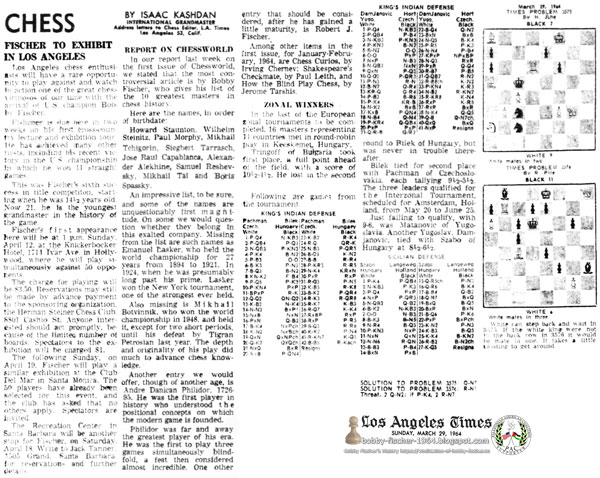The Los Angeles Times Los Angeles, California Sunday, March 29, 1964 - Page 59
Fischer To Exhibit In Los Angeles
Los Angeles chess enthusiasts will have a rare opportunity to play against and watch in action one of the great chess virtuosos of our time with the arrival of U.S. champion Bobby Fischer.
Fischer is due here in two weeks on his cross-country lecture and exhibition tour. He has achieved many other firsts, including his recent victory in the U.S. championship in which he won 11 straight games.
This was Fischer's sixth success in title competition, starting when he was 14½ years old. Now 21, he is the youngest grandmaster in the history of the game.
Fischer's first appearance here will he at 1 p.m. Sunday. April 12, at the Knickerbocker Hotel, 1714 Ivar Ave. in Hollywood, where he will play simultaneously against 50 opponents.
The charge for playing will be $3.50. Reservations may still be made by advance payment to the sponsoring organization, the Herman Steiner Chess Club, 8801 Cashio St. Anyone interested should act promptly, because of the limited number of boards. Spectators to the exhibition will be charged $1.
The following Sunday, on April 19, Fischer will play a similar exhibition at the Club Del Mar in Santa Monica. The 50 players have already been selected for this event, and the Club has asked that no others apply. Spectators are invited.
The Recreation Center in Santa Barbara will be another stop for Fischer, on Saturday, April 18. Write to Jack Tanner, 1505 Grand, Santa Barbara, for reservations and further details.
Report On Chessworld
In our report last week on the first issue of Chessworld, we stated that the most controversial article is by Bobby Fischer, who gives his list of the 10 greatest masters in chess history.
Here are the names, in order of birthdate:
Howard Staunton. Wilhelm Steinitz. Paul Morphy, Mikhail Tchigorin, Siegbert Tarrasch, Jose Raul Capablanca, Alexander Alekhine, Samuel Reshevsky, Mikhail Tal and Boris Spassky.
An impressive list, to be sure, and some of the names are unquestionably first magnitude. On some we would question whether they belong in this exalted company. Missing from the list are such names as Emanuel Lasker, who held the world championship for 27 years from 1894 to 1921. In 1924, when he was presumably long past his prime. Lasker won the New York tournament, one of the strongest ever held.
Also missing is Mikhail Botvinnik, who won the world championship in 1948, and held it, except for two short periods, until his defeat by Tigran Petrosian last year. The depth and originality of his play did much to advance chess knowledge.
Another entry we would offer though of another age, is Andre Danican Philidor, 1726-95. He was the first player in history who understood the positional concepts on which the modern game is founded.
Philidor was far and away the greatest player of his era. He was the first to play three games simultaneously blindfold, a feat then considered almost incredible. One other entry that should be considered, after he has gained a little maturity, is Robert J. Fischer.
Among other items in the first issue, for January-February, 1964, are Chess Curios, by Irving Chernev: Shakespeare's Checkmate, by Paul Leith, and How the Blind Play Chess, by Jerome Tarshis.























